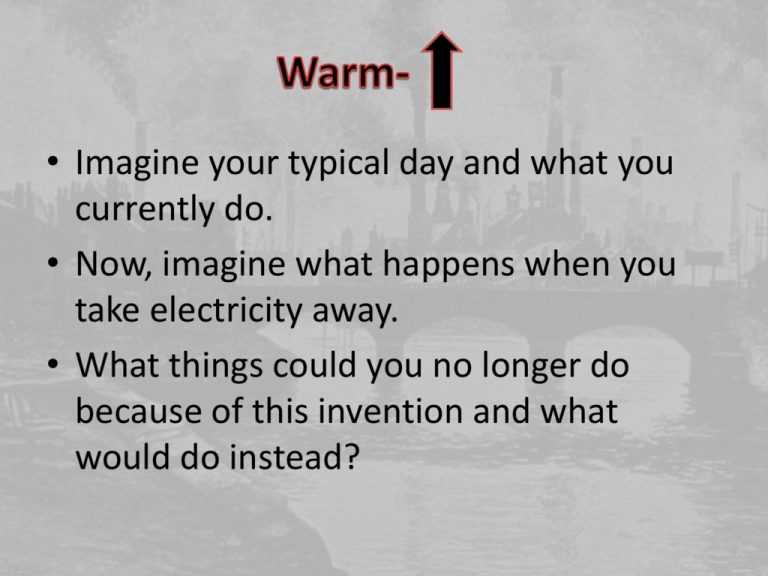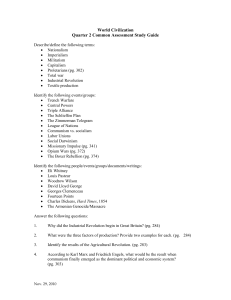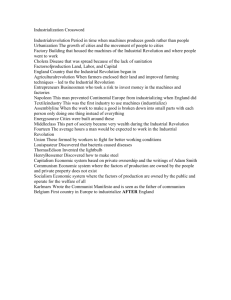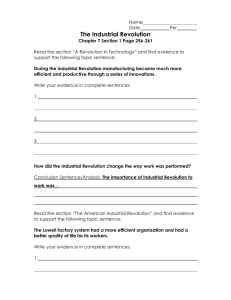Industrial Revolution
advertisement

• Imagine your typical day and what you currently do. • Now, imagine what happens when you take electricity away. • What things could you no longer do because of this invention and what would do instead? The Start of the Industrial Revolution Ch. 21.1-2 I. Beginning of the Industrial Revolution (1750 to 1850) A. Industrial Revolution changed Europe from a mostly agricultural economy to industrializationwork driven by machinery B. Agricultural Revolution (started 1700) 1. New farming inventions, techniques, and new foods increased food supply and increased population 2. Enclosure movement- wealthy farmers created large, enclosed farms so poor farmers went to cities for work I. Beginning of the Industrial Revolution (1750 to 1850) C. Started in Great Britain because it had the four factors of production: 1. Land: Lots of coal and iron, waterways, shipping 2. Labor: growing population, needed work, free to move 3. Capital: money for investment 4. Entrepreneurs: GB had the political stability and business friendly environment for risktakers II. Cloth Making A. Textiles were the first major industry 1. Gained slave grown cotton from America 2. At first woven into cloth in homes in cottage industries II. Cloth Making A. Inventions 1. Eli Whitney’s cotton ginremoved seeds from cotton 2. James Hargreave’sspinning jenny- spun cotton into threads 3. John Kay’s flying shuttleweaved yarn into cloth B. Eventually production moved to large factories, putting cottage industries out of business • What were factory conditions like? Page 641-644 III. Factory System A. At first, factories were powered by watermills B. Steam Engineinvented by James Watt, created a new source of power for factories III. Factory System C. Entrepreneurs and investors came together to form corporationsbusinesses owned by a group of people D. Urbanization- movement to cities people migrated to mill towns or cities for work increase in pollution, disease, crime III. Factory System E. Conditions 1. Men, women, and children worked in factories 2. Long hours and dangerous conditions 3. Some workers formed labor unions to get better conditions and pay – Mill Times Documentary III. Factory System F. Mass Production- system of making many identical items 1. Machines and interchangeable partsidentical parts that could easily be fixed or replaced 2. Production increased with the innovation of the assembly line- workers divide their labor so repetitively do a small task in the production process IV. Spread of the Industrial Revolution A. Great Britain passed laws to prevent machine technology from spreading B. Some British entrepreneurs moved to the north of the USA C. After French Revolution, France and small German states adopted industrialization IV. Spread of the Industrial Revolution DBQ • Once you finish all sources and questions. • Create an outline using the sources to TURN IN for a grade. • What role does our government (U.S.) play in society? What role do you think government play in society? Industrial Revolution and Society Ch. 21.3, 23.1 I. Economic Philosophy A. Capitalism- advocated by Adam Smith 1. No gov’t intervention in the economy, people guided by self-interest 2. Thomas Malthus believed that population would grow faster than food so poverty was inevitable I. Economic Philosophy B. Socialism 1. Society/gov’tco uld help control economy in order to benefit all 2. Robert Owen founded a failed utopian society based on socialism I. Economic Philosophy C. Communism- radical socialist ideas of Karl Marx 1. Believed that the workers (proletariat) would rise up in revolution against the ruling class (bourgeoisie) 2. The gov’t should control everything to create equality Capitalism/Communism Quotes • The following quotes were said by either Adam Smith (Capitalism) or Karl Marx (Communism). • Match their names to the quotes on the three next slides. Capitalism/Communism Quotes 1. “The ruling ideas of each age have ever been the ideas of its ruling class.” 2. “It is not from the benevolence of the butcher, the brewer, or the baker that we expect our dinner, but from their regard to their own interest.” 3. “Workers of the world unite; you have nothing to lose but your chains.” 4. “Every man is, no doubt, by nature, first and principally recommended to his own care; and as he is fitter to take care of himself than of any other person, it is fit and right that it should be so.” Capitalism/Communism Quotes 5. “Sell a man a fish, he eats for a day, teach a man how to fish, you ruin a wonderful business opportunity.” 6. “The real tragedy of the poor is the poverty of their aspirations.” 7. “Every man, as long as he does no violate the laws of justice, is left perfectly free to pursue his own interests his own way, and to bring both his industry and capital into competition with those of any other man, or order of men.” Capitalism/Communism Quotes 8. “From each, according to his ability; to each, according to his need.” 9. “Consumption is the sole end and purpose of all production; and the interest of the producer ought to be attended to, only so far as it may be necessary for promoting that of the consumer.” 10.“Abolish all private property.” Warm-Up • What changes took place in society during the Industrial Revolution? Page 649-651 II. Changes in Society A. Increased population 1. Agricultural revolution, more jobs, and better medicine led to a large population increases, esp. in cities 2. Except in Ireland- a Potato Famine led to 1 million starved and 1.5 million emigrated to the USA II. Changes in Society B. Social Classes 1. New wealth increased standard of living for all classes because of lowcost goods 2. Middle class developed for managers and merchants 3. Some entrepreneurs became very wealthy dominating new industries- Carnegie (steel), Rockefeller (oil), Vanderbilt (railroads) • Titans of Industry II. Changes in Society C. Daily Life 1. New inventions increased leisure time that was used for sports, entertainment, and art 2. Transportation increased travel and movement 3. Lower class women joined the work force more II. Changes in Society D. Education 1. Education required more for children 2. Newspapers informed the public and got them more politically involved III. British Reform Movement A. Liberals- wanted to reform society to make it more equal and give more freedoms B. Conservativeswanted to keep old order of aristocracy III. British Reform Movement C. Reform Act of 1832- gave voting rights to middle-class men D. Parliament passed a series of Factory Acts that limited working hours and gave education for children and improved factory conditions E. Parliament abolished slavery in their empire III. British Reform Movement F. A series of Voting Acts (1867-1885) extended suffrage (right to vote) to most men G. Women did not gain suffrage until 1918 Warm-Up • What were some of the changes in society during the Industrial Revolution? Impact of the Industrial Revolution Ch. 22 I. Science A. New Advancements 1. Medicine a) Louis Pasteur discovered the harmful effects of bacteria and developed ways of destroying them b) Surgeries became safer with the use of anesthetic and Joseph Lister’s method of killing germs using anapestic I. Science 2. Biology: Charles Darwin developed the theory of evolution- species change as a result of natural selection 3. Chemistry a) Connection discovered b/w magnetism and electricity b) Periodic table developed c) Marie and Pierre Curie discovered some elements release energy in radioactivity I. Science 4. Psychology: new field studying the mind and behavior a) Sigmund Freud developed psychoanalysis which focused on basic human desires and the unconscious mind 1) Thoughts mental illness could be caused by repressed thoughts in the unconscious mind I. Science b) Pavlov, Skinner, and Watson worked on conditioningprocess of connecting behavior to a stimulus Warm-Up • Moonlight Sonata • Does the following piece make you feel anything? • Are you reminded of a certain scene or does it make you recall a specific memory in your life? I. Science B. New Inventions 1. Electric powersmaller machines and factories anywhere 2. Telegraph- invented by Samuel Morse, allowed fast global communication Morse Code A .E . I .. M -Q --.U ..Y -.-2 ..--6 -.... B -... F ..-. J .--N -. R .-. V ...Z --.. 3 ...-7 --... C -.-. G --. K -.O --S ... W .-0 ----4 ....8 ---.. D -.. H .... L .-.. P .--. T X -..1 .---5 ..... 9 ----. I. Science 3. Steamship- allowed transportation upriver and w/o wind 4. Railroad- made transportation over land fast and cheap I. Science 5. Telephone- invented by Alexander Graham Bell 6. Lightbulb- invented by Thomas Edison 7. Radio- wireless communication and entertainment II. Art A. Romanticism: Emphasis on personal emotional expression 1. Focused on the individual, imagination, and liberty 2. Ludwig van Beethoven- inspiration to Romantic artists because of emotionalism in his music 1. Beethoven Songs Romanticism II. Art B. Realism: show the reality of everyday life 1. Focus on objective reality discovered by the individual 2. Charles Dickens wrote novels that showed hardships of the poor because of industrialization Realism II. Art C. Impressionism: used bright colors and brushstrokes to recreate a way of looking at everyday things III. Foreign Policy A. Great Britain gave self-government to Canada, Australia, and New Zealand but held tight control over Ireland III. Foreign Policy B. Demand for more resources for factories drove Europeans to take over new lands III. Foreign Policy C. New weapons from the Industrial Revolution made it easier to dominate most of the world’s population




